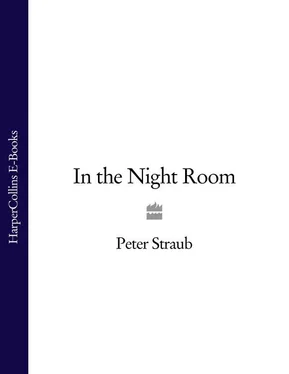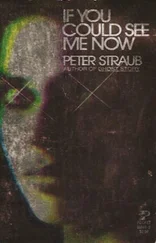He longed for the reassuring sound of other people’s voices. He could have gone to the Fireside—okay, not the Fireside, but any one of the little bars and restaurants scattered throughout his village: for over the previous two decades that was what the territory bounded by West Broadway, Broome Street, Broadway, and Canal Street had inevitably become: his hometown, the one place where he felt truly comfortable.
He turned around, and a hint of movement caught his eye. On a street where only he was in motion, the idea of movement seemed a little spooky. Tim Underhill turned back, then spun his head again, scanning the sidewalks and the anonymous facades. It was as if the street had been evacuated, specifically for the purpose of stranding him in it.
Thin, foggy, impenetrable veils hung like sheets of cloud-colored iron at both ends of the block. The ordinary sounds of the city were muted and distant, walled out. If he looked hard at the cobblestones, he thought, he would see unreality’s slick, cartoonish sheen. Everything that had happened to him over the past two days had been designed to get him here, to this empty block on a false Crosby Street.
Now it had happened for real, Tim thought. His mind had rolled past its own edge. Even the gray air seemed to resist him as he turned around once again to face north: uptown, the direction that would take him back to Broome Street. And as he turned, he thought he detected a hint of movement closer to him than the first time. Tim scanned the storefronts and windows and this time really noticed that every one of them was dark. The hypothetical movement had been off to his right and behind the large plate-glass window of a vanished art gallery. He looked more closely at the window and saw only the murk of an empty room.
Once, the gallery had been dedicated to minimalist installations that featured simulated body parts, piles of dirt, and reams of text. Behind the scrim of the dirty enormous window, the bare walls receded into darkness. When he shifted his glance to the cloud-gate at the top end of Crosby, something in the gloom at the rear of the empty gallery revealed itself, then slid back into invisibility. Whatever it was had been looking at him. He snapped his head back and stared into the window. Then he moved forward across the sidewalk, bringing more of the interior into view.
At the far end of the room, a dim shape materialized out of the darkness and seemed to move forward, matching his movements.
Jeez, he thought, stung by a recollection, didn’t I write this somewhere?
He took another reluctant step forward. In either mockery or challenge, the figure inside matched him again. In the darkness and obscurity at the back of the immense room, its shape, which was not human, seemed to waver, swelling and shifting like smoke. A long, wide body lowered itself a few inches, as if crouching. There was the suggestion of ears. A silvery pair of eyes swam into view and focused intently on him. A kind of blunt force streamed toward him. Tim gasped and stepped back. He felt as though he had been pinned by a pair of flashlights. Unrelenting and soulless, made entirely of will and antipathy, the creature’s eyes hung in the gloomy air.
He found himself moving backward and off the sidewalk, into the middle of the cobbled street. It seemed important not to turn his back.
Knowing that his terror was ridiculous did nothing to tame it. He continued to move across the street, eyes locked with the creature’s, pushed himself up onto the far sidewalk, and whirled to sprint north toward Broome Street. Around him, the atmosphere tingled and snapped. He once again became aware of the rain. Before he had taken two long strides, a door opened in what had seemed a blank wall, and a couple emerged from a tall iron-fronted building. The world around him had solidified into its old unreliable self. He reached Broome with the sense of having broken through an invisible but palpable barrier.
Because the people who had reappeared on the sidewalk were staring at him, he slowed his pace. By the time he was crossing Broadway, he had brought himself down to a walk. His heart was knocking in his chest, and he could hear his own ragged breathing. A pair of shiny young men with rain-resistant hair turned their heads to see how much trouble he was in.
‘I’m okay,’ he said.
The young men snapped their heads forward and began walking a little faster, leaking disdain.
Strange, how normal the world seemed to him now, after Crosby Street. Those young men, what would they say if they knew he was getting e-mail from dead classmates? No more. Underhill was turning his back on all that nonsense. He resolved to concentrate on his work. From here on out, he would delete, unread, all e-mails without domain names. He wanted order and productivity.
He reached this decision with the sense of having established the ground rules for the next six months of his life. He would create a clearing, and in that clearing, free of uncertainty and disorder, he would write his book. Within imagination’s protective confines, he would set his heroine in motion. She was supposed to be in emotional extremity, not he. He needed to get in balance again.
With this resolve in mind, Tim turned the corner of Wooster and Grand, looked through the drizzle to the entrance of his building, and noticed a tall man in jeans and a hooded sweatshirt emerging through the open door. Oh, no, he thought, without being entirely certain why he should react this way. Then he looked more closely beneath the edge of the hood and saw what part of him had already registered, the face of Jasper Kohle. Kohle was grinning at him.
Tim stopped moving. For a second or two, Kohle’s face seemed to slide over its bones, and the bones themselves to shift. All that remained steady was the grin. Kohle’s face disappeared when his body turned, and he began to move in a deliberate slow jog toward West Broadway, where a wet young woman with green hair and facial piercings slouched past a steady stream of cars.
‘Hey!’ Tim shouted. ‘What are you doing?’
Kohle jogged around the corner, and Tim followed. For a moment he saw Kohle’s back moving purposefully away from him; then it slipped around a group of policemen staring at the entrance of a shop, and was gone. Tim thought of calling out to the cops, but he realized that he had no crime to report.
‘Oh, shit,’ he said. ‘Oh, hell.’ One of the cops turned his head and gave him a look that said, Do you really want to mess up my day?
He spun around and raced back to the entrance of 55 Grand, as if haste could alter whatever he was going to find in his loft. The key jittered in the lock, demanding extra body English before it slid home. Though Tim’s mind was empty of nearly everything but anxiety, he managed to wonder how Kohle had gotten inside without a key. Callers could not be buzzed in: loft holders had to go downstairs and open two sets of doors for their visitors. This reality created a possibility for hope. Maybe Kohle’s visit had been no more than the act of a stalker pushing the envelope.
Tim ran past the elevator and charged up the staircase. His heels rang on the metal steps. He was breathing hard by the time he reached his door, and he had a sharp stitch in his side. He placed his left hand over the pain, with his right inserted his second key into the slot, and the door swung open by itself. Instead of unlocking it, he had almost locked it.
Конец ознакомительного фрагмента.
Текст предоставлен ООО «ЛитРес».
Прочитайте эту книгу целиком, купив полную легальную версию на ЛитРес.
Читать дальше












